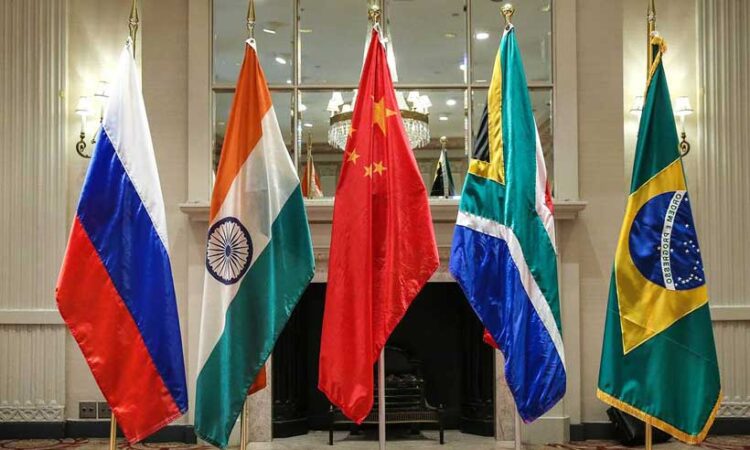
The BRICS term refers to a group of five nations, namely Brazil, Russia, India, China, and South Africa. The first summit of this alliance in 2009 sparked debates on its geopolitical and geo-economic significance. The political pundits view it as a new political world order and a shift in power from the ‘Global North’ to the ‘Global South’. The member nations account for almost half of the world’s population and reports suggest that their combined Gross Domestic Product (GDP) is 31.5%, surpassing the G7’s contribution of 30.7%. Despite their differences in political, economic, and cultural spares, BRICS countries have launched the New Development Bank with seed money of $50 billion to boost their greater integration and strengthen their position in the international arena.
Initially, BRICS was recognized as a forward-thinking economic forum, but its focus shifted after the Russia-Ukraine conflict. The forum is now pointing out critical matters such as trade, finance, climate change, and energy security, and its impact extends to shaping the global economic landscape. As a result, it is going to challenge the dominance of Western-backed the World Bank and the International Monetary Fund (IMF).
The magic bone for BRICS to bring them together is its diversity. Each member country brings a unique set of economic and political landscapes to the forum, which has created a rich tapestry of interests and perspectives. For example, Brazil is a major agricultural exporter, while Russia is a leading energy exporter. India is an emerging economic power which has a large and growing middle class, while China is a global economic and manufacturing superpower. South Africa, meanwhile, is a leading player in the mining industry. This diversity has strengthened BRICS to explore its resources and expertise to pursue the shared challenges of its own development path.
BRICS is also an outcome of challenging the monopoly and questioning the legitimacy of existing West-backed monetary Institutions and frameworks. The IMF and World Bank were established after World War II to dominate global trade and market access by the West. These Institutions are facing criticism globally. It works as an expansion tool for the ‘Global North’ by considering political concerns rather than an acute crisis for loan facilities. Even nowadays, they use democracy and Human Rights as a fig leaf to masquerade the Western political agenda. However, BRICS has sought to establish new trading relationships and agreements outside the Western-dominated system, which will curtail the advantages of the West’s so long-enjoyed trade agreements and market access. BRICS has the potential to help poorer countries as it does not pursue any political agenda nor indirectly manipulate and control local economics. Moreover, NDB and Asian Infrastructure Investment Bank(AIIB) are more reflective of their priorities to represent the interests of emerging economies.
Western Monopoly in geopolitics, the recently Russia-Ukraine war has exposed the necessity of massive expansion in BRICS. The success of BRICS has made other economic giants like Argentina, UAE, Saudi Arabia, Algeria, and Mexico interested to invest in this bloc. Recently, some Western countries are going through a tremendous economic crisis. Their economic growth is declining, and social turmoil is increasing. In this critical juncture, the ‘Global South’ has taken a step to introduce an alternative to the dollar-based trading system. China and Brazil agreed to cross-border trade with local currency without the dollar system. It is more likely that some Latin countries are going to follow the local currency system for cross-border trade. ASEAN nations have called for an alternative to dollar-based trading at finance ministers’ and central bank governors’ summits in Indonesia. Russia-India is trading with local currency and India-Bangladesh is in process. No doubt, this trend was neither the first nor it will be the last.
BRICS has significant potential for economic growth and innovation. Their collective strengths and investments in emerging technologies like artificial Intelligence, blockchain and renewable energy could make a major driving force for the global economy and innovation in the coming days. This would require greater investment in education, research, and development as well as greater cooperation between member countries to share knowledge and expertise. BRICS also has significant potential for growth and influence. It could lead to promoting sustainable development and climate change. It could help to drive the transition to a more sustainable and equitable global economy.
In addition, BRICS countries are asserting themselves on the global political stage. This is evident in areas such as climate change, International negotiations, peacekeeping, and conflict resolution efforts where member countries have emerged as key players. This increased assertiveness challenges the traditional role of Western power as the dominant actor in global politics. BRICS countries are also challenging the West’s cultural dominance. Now, BRICS is changing the cultural landscape, which is becoming more diverse and pluralistic. Defying the Western culture in music, film and literature, BRICS countries are producing their own distinctive styles and voices.
At the outset, the member countries of BRICS are facing some challenges too. There is a concern about political tension, particularly between India and China. The shifting of global political landscapes like protectionism, populism, and nationalism are threatening the core principles of free trade and globalisation which will underpin the BRICS’s success. Another challenge is the willingness to join this organisation. The increase in member states will make it very difficult to maintain the current growth rate. At the same time, economic and political freedom has to be ensured in new member states.
It is important to note that BRICS countries are not seeking to replace the West, rather they are seeking greater representation and influence in global affairs. BRICS demands a more equitable and inclusive global economic and political system. Let the West recognise the BRICS as an opportunity for greater cooperation and collaboration between different regions and cultures.



